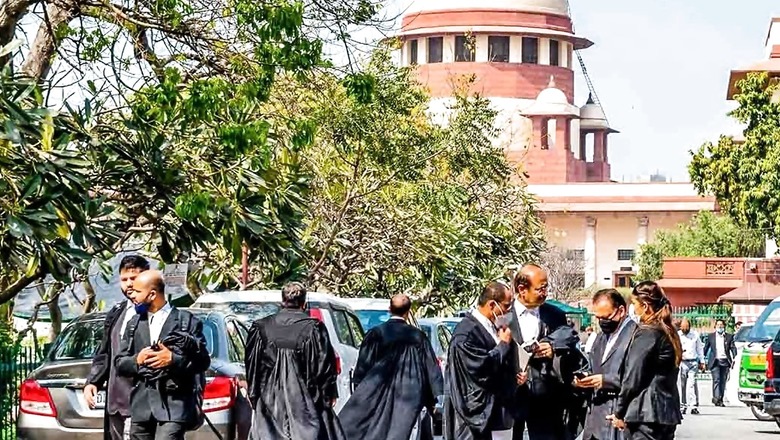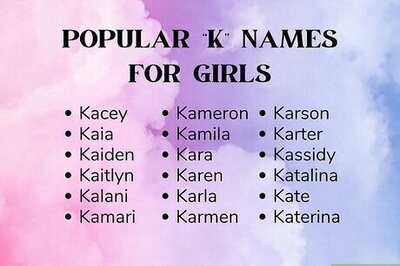
views
In one of the most crucial and anticipated verdicts, the Supreme Court is scheduled to pronounce on Monday its judgement on a batch of pleas challenging the validity of the 103rd Constitutional amendment providing 10 per cent reservation to the Economically Weaker Sections (EWS) persons in admissions and government jobs.
The apex court had on September 27 reserved the verdict on the legal question of whether the EWS quota violated the basic structure of the Constitution after hearing a battery of senior lawyers, including the then Attorney General KK Venugopal and Solicitor General Tushar Mehta, in the marathon hearing that had lasted for six-and-half-day.
Academician Mohan Gopal had opened the arguments in the case before the five-judge Constitution bench headed by Chief Justice Uday Umesh Lalit, which also comprised justices Dinesh Maheshwari, S Ravindra Bhat, Bela M Trivedi, and JB Pardiwala, on September 13 and opposed the EWS quota amendment by terming it as “deceitful and a backdoor attempt” to destroy the concept of reservation.
Tamil Nadu, represented by senior advocate Shekhar Naphade, had also opposed the EWS quota, saying economic criteria cannot be the basis for classification and the top court will have to revisit the Indira Sawhney (Mandal) judgement if it decides to uphold this reservation.
On the other hand, the then attorney general and the solicitor general had vehemently defended the amendment, saying the reservation provided under it was different and had been given without disturbing the 50 per cent quota meant for the socially and economically backward classes (SEBC).
The top court heard as many as 40 petitions and most of the pleas, including the lead one filed by ‘Janhit Abhiyan’ in 2019, challenged the validity of the Constitution Amendment (103rd) Act 2019.
Ahead of the judgment, News18 takes a look at the issue and the debates around it:
The Move
The recommendation to grant EWS reservation came from a commission headed by Major General (retd) SR Sinho, which was constituted by the UPA government in March 2005 and submitted its report in July 2010.
The Sinho Commission recommended that all below-poverty-line (BPL) families within the general category as notified from time to time, and also all families whose annual family income from all sources is below the taxable limit, should be identified as EBCs (economically backward classes).
The Centre, through the 103rd Constitutional Amendment Act, 2019, introduced the provision for Economically Weaker Sections (EWS) reservation in admissions and public services.
The rationale was that the amendment could empower state governments to provide reservations on the basis of economic backwardness, which could be determined by criteria such as land size owned, annual income, etc.
Earlier, the Centre, in 2019, had also told the apex court that its law, granting a 10-per cent quota for Economically Weaker Sections, was brought in to promote “social equality” by providing “equal opportunities in higher education and employment to those who have been excluded by virtue of their economic status”.
The Lok Sabha and the Rajya Sabha cleared the bill on January 8 and 9 in 2019 respectively and it was then signed by then President Ram Nath Kovind. The EWS quota is over and above the existing 50 per cent reservation to SCs, STs, and Other Backward Classes (OBCs).
Why the uproar?
The strongest criticism against the amendment comes from petitioners who call it “an attack on the constitutional vision of social justice” and “a fraud on the Constitution”, adding that if upheld, it will mark the end of equality of opportunity. They also argue that it violates the basic structure of the Constitution and breaches the 50 per cent ceiling for reservation fixed by the Supreme Court ruling in the Mandal Commission case.
Arguing that the way forward to address economic problems was by providing money or scholarships, Professor Ravi Verma Kumar, appearing for the petitioners, had said: “You don’t take a person suffering from tuberculosis to a maternity ward. If a poor man has a problem, give him money or scholarship.”
Dr Mohan Gopal argued that since the EWS quota excluded socially and educationally backward classes and limited the benefits only to the poor among the “forward classes”, it resulted in the violation of the principles of equality and social justice. This, he added, in turn infringed the basic structure of the Constitution.
Another issue the petitioners pointed to was the loopholes in the process of deciding who was backward. Further, Senior Advocate Gopal Sankaranarayanan argued that in clause 6 of Article 15, the words: “in addition to the existing reservations” violated the 50 per cent ceiling limit.
The bench, on September 8, had framed three broad issues for adjudication arising from the pleas challenging the Centre’s decision to grant 10 per cent reservation to EWS in admissions and jobs.
It had said the three issues suggested by the then attorney general for the decision “broadly” covered all the aspects relating to the petitions on the constitutional validity of the decision to grant the reservation.
“Whether the 103rd Constitution amendment Act can be said to breach the basic structure of the Constitution by permitting the State to make special provisions, including reservation, based on economic criteria,” read the first issue framed.
The second legal question was whether the constitutional amendment could be said to breach the basic structure by permitting the state to make special provisions concerning admissions to private unaided institutions.
“Whether the 103rd Constitution amendment can be said to breach the basic structure of the Constitution in excluding the SEBCs/OBCs, SCs/STs from the scope of EWS reservation,” the third issue, to be adjudicated upon by the bench, read.
What has been the government’s line of argument?
Assuring that the EWS quota would in no way erode the rights of SCs, STs and OBCs, Venugopal had told the court: “EWS have been given reservation for the first time. On the other hand, so far as the SCs and STs are concerned, they have been loaded with benefits by way of affirmative actions.”
The Indian Express reported that the Ministry of Social Justice and Empowerment also argued that under Article 46 of the Constitution, part of Directive Principles of State Policy that is non-justiceable, the state can take such measures as it has a duty to protect the interests of economically weaker sections: “The state shall promote with special care the educational and economic interests of the weaker sections of the people, and, in particular, of the Scheduled Castes and the Scheduled Tribes, and shall protect them from social injustice and all forms of exploitation.”
What happens now?
The final outcome in the case can range from the amendment being upheld as constitutionally valid, scrapped, read down (ie dilution of specific components, but not a complete invalidation) or even a reference of the matter to a larger bench, the Quint reported.
Read all the Latest Explainers here



















Comments
0 comment